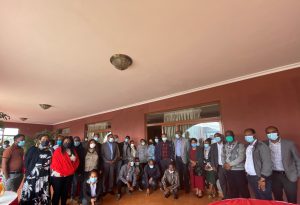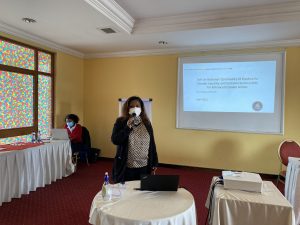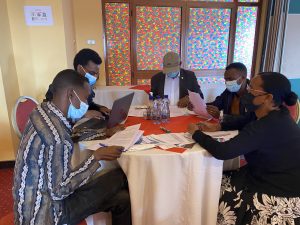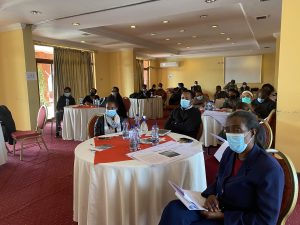On April 26, 2021, the Global Green Growth Institute (GGGI) Ethiopia Office and SouthSouthNorth (SSN) in collaboration with the Ministry of Finance (MoF) and Environment Forest and Climate Change Commission (EFCCC) of Ethiopia organized the first meeting of the Community of Practice (CoP) Gender Equality and Social Inclusion (GESI) on Climate Change in Bishoftu, Ethiopia. The meeting gathered gender and climate change experts from MoF, EFCCC, CRGE Sector ministries, Ministry of Women, Children and Youth (MoWCY) and Women, Children and Youth Bureaus of the Regional National States.
The aim of the meeting was to bring together gender and climate change experts together for enhanced climate action as these units are working in silos in their respective institutions for creating enabling working environment on how to create gender-transformative action on the ground by accessing the latest knowledge, provide hands-on guidance and inform on existing opportunities. In addition, the meeting was aimed at discussing concepts and principles of gender responsive and socially inclusive approaches, develop a work plan of the community of practice, present practical tools on gender mainstreaming and social inclusion, including the role out of interactive game, and provide a stock-taking platform to bridge institutional gaps by popularizing gender analysis, frameworks and action plans.
The meeting highlighted the need for the CRGE units and gender units to work together and gender mainstreaming is the responsibility of all. Further, the institutions were engaged in the event because of their responsibilities to mainstream gender in climate action both at national and sub national levels. The institutions will benefit from the knowledge and experience shared among the various actors and different methodologies that support more robust engagement of gender issues in development and climate actions. The meeting further created a platform for the institutions to discuss and set a mechanism that ensures the sustainability of the CoP.

During the meeting, members provided feedback on the concept note/ToR of the community of practice including its objective, pillars and governance structure paving the way for its sustainability. Additionally, a one-year action plan was developed. It was also agreed on the next steps including, the secretariate to share the final ToR and action plan for members in the second week of May 2021 for their endorsement and the next quarterly meeting was proposed to be organized in June 2021.
The MoF and EFCCC women children and youth directorate (GAD) units as per their mandate will co-chair the initiative to coordinate a network of all partners who have been working and are aspiring to engage and make gender one of their critical agenda in the climate action. The CRGE Facility will provide the Secretariat role for the CoP to organize its quarterly meeting on a regular basis and enable the co-chairs and other members of the CoP to own the initiative in their institution to ensure its sustainability. The CoP will form Sub-Committees that will be accountable to the co-chair as necessary.
Gender equality is increasingly being recognized as a critical development issue in Ethiopia. All Federal Ministries including MoF and EFCCC are mandated to ensure women benefit from programs, projects and policies through the Gender Affairs Directorate. Since the launching of its Climate Resilient Green Economy (CRGE) Strategy in 2011, the Federal Government of Ethiopia has been striving to direct its development towards gender responsive and climate compatible direction and has committed to gender equality, as outlined in the National Action Plan for Gender Equality and the National Development Plan. Further, as a Party to the United Nations Framework Convention on Climate Change (UNFCCC), Ethiopia is working towards gender responsive climate action, in line with the Gender Action Plan agreed in 2017.
Reaffirming the centrality of gender responsive and inclusive approach, the CRGE Facility in collaboration with GGGI as delivery partner is implementing a Green Climate Fund (GCF) Readiness Project with one of the project priorities focusing on the development of gender mainstreaming strategy to address gender gaps and opportunities, especially in its climate finance mandates. Accordingly, a gender mainstreaming strategy has been developed and shared with all relevant institutions.
Mainstreaming gender in climate action has been a focus for the CRGE implementing and executing entities and for the MoWCY. Going forward, there is a need to bring together all these efforts for the purposes of lesson sharing, knowledge management and enhanced national level capacity building. This is expected to contribute towards the efforts made to improve the understanding of gender issues. It further enhances institutional capacity in the design, implementation and monitoring and evaluation of the gender perspectives of climate change interventions.
However, lessons, experiences, opportunities and challenges still remain within the confines of each of these actors, without knowledge being formally transferred and used widely, resources shared and synergies created. It is believed that such institutionalization needs to be led by the gender/women affairs directorates within the relevant government Ministries. Cognizant of this, the GCF readiness project of GGGI supported the CRGE Facility to establish a community of practice on gender and climate change which was launched in December 2020.


